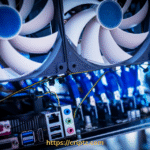With the growing popularity of cryptocurrency, many enthusiasts wonder if they can put their gaming PCs to work mining Bitcoin. Since gaming rigs often come with high-end GPUs (graphics processing units), it seems logical to repurpose them for crypto mining. But is it really possible—or profitable—to mine Bitcoin using a gaming computer in 2025? Let’s explore the facts, limitations, and alternatives.
Understanding Bitcoin Mining Basics
Before diving into the hardware specifics, it’s crucial to understand what Bitcoin mining actually involves. Bitcoin mining is the process of validating transactions on the blockchain and earning newly minted Bitcoin as a reward. This process requires solving complex mathematical puzzles through Proof of Work (PoW), which demands immense computational power.
Unlike altcoins such as Ethereum (prior to its move to Proof of Stake), Bitcoin mining primarily uses ASICs (Application-Specific Integrated Circuits)—specialized machines designed solely for mining. These devices are far more efficient and powerful than standard gaming GPUs.
Can a Gaming PC Mine Bitcoin?
Technically, yes—you can mine Bitcoin on a gaming PC, especially if your computer is equipped with a powerful GPU like an NVIDIA RTX 3080, 4080, or AMD RX 7900 XTX. However, doing so directly is extremely inefficient and unprofitable for most users. The SHA-256 algorithm used in Bitcoin mining is optimized for ASICs, not GPUs, meaning your gaming rig would earn only a tiny fraction of Bitcoin, even if left running 24/7.
In short, you’ll spend more on electricity than you’ll make in Bitcoin rewards, especially in regions with high energy costs.
Is It Possible?
Yes, it’s technically possible to mine Bitcoin using a gaming PC, but it’s not practical. Modern gaming PCs, equipped with powerful GPUs, can run mining software. However, the Bitcoin network’s complexity has grown significantly, making it nearly impossible for a gaming PC to compete with specialized mining hardware.
Why It’s Not Profitable?
The profitability of mining Bitcoin on a gaming PC is hindered by several factors. The network’s mining difficulty, currently around 126.27 trillion, requires vast computational power that only ASICs can deliver efficiently. Additionally, electricity costs often outweigh the minimal rewards earned, and continuous mining can strain your PC’s hardware.
Alternative Option: Mine Altcoins, Convert to Bitcoin
A more realistic approach for gaming PC owners is to mine altcoins like Ravencoin, Ergo, or Flux, which are more GPU-friendly. Once mined, you can convert those coins into Bitcoin on a crypto exchange. This indirect method is more feasible and allows you to still accumulate Bitcoin while utilizing your gaming hardware effectively.
Many miners use software like NiceHash, which automatically selects the most profitable coin to mine and pays you out in Bitcoin. This offers a plug-and-play mining solution without needing in-depth technical knowledge.
Current State of Bitcoin Mining
As of July 2025, Bitcoin mining is more challenging than ever due to the network’s high difficulty and hash rate:
- Mining Difficulty: The Bitcoin network adjusts its difficulty every 2,016 blocks (approximately every two weeks) to maintain an average block time of 10 minutes. The current difficulty is around 126.27 trillion, reflecting the immense computational power required to mine a block [1].
- Network Hash Rate: The total hash rate of the Bitcoin network exceeds 1 zettahash per second (ZH/s), or 1,000,000,000,000,000,000,000 hashes per second [1]. This is driven by large-scale mining operations using ASICs, which can achieve hash rates in the terahash (TH/s) or petahash (PH/s) range.
- Gaming PC Limitations: A high-end gaming GPU, such as an NVIDIA RTX 3080, might achieve a hash rate of 50-100 MH/s (megahashes per second) for Bitcoin’s SHA-256 algorithm. This is a tiny fraction of the network’s total hash rate, making it nearly impossible for a gaming PC to solve a block.
| Factor | Gaming PC | ASIC Miner |
|---|---|---|
| Hash Rate | 50-100 MH/s | 100+ TH/s |
| Power Consumption | 500-1000 W | 2000-4000 W (but more efficient) |
| Efficiency | Low (general-purpose hardware) | High (specialized for SHA-256) |
| Cost | $1000-$3000 (existing PC) | $2000-$20,000 per unit |
Profitability of Mining Bitcoin with a Gaming PC
Mining Bitcoin with a gaming PC is generally unprofitable due to several factors:
- Low Hash Rate: The hash rate of a gaming PC is insufficient to compete with ASICs. Even if a gaming PC runs 24/7, it’s unlikely to solve a block within a reasonable timeframe, as the probability is akin to winning a lottery [4].
- High Electricity Costs: Mining is energy-intensive. A gaming PC might consume 500-1000 watts per hour, costing $12-24 per day at an average electricity rate of $0.10 per kWh. In contrast, the revenue from mining Bitcoin with a gaming PC is estimated to be less than $1 per day, leading to a net loss [3].
- Historical Context: In 2018, when Bitcoin was priced at $9,000, a high-end GPU like the NVIDIA GTX 980 TI could generate about $70 per month after electricity costs [2]. However, with the current difficulty of 126.27 trillion and increased competition, profitability has plummeted.
- Hardware Wear and Tear: Continuous mining puts significant stress on a gaming PC’s GPU and other components, potentially leading to overheating, reduced performance, or hardware failure. This risk further diminishes the appeal of mining with a gaming PC.
For example, a Reddit user in 2023 compared mining Bitcoin with a gaming PC to buying a lottery ticket, highlighting the low probability of earning rewards [4]. Even with low electricity costs (e.g., $0.07 per kWh), the revenue generated is unlikely to offset operational costs.
Risks and Considerations
Beyond profitability, there are additional risks to consider when mining Bitcoin with a gaming PC:
- Hardware Damage: Prolonged mining can overheat GPUs, leading to thermal stress and potential failure. Proper cooling and monitoring are essential but may not fully mitigate the risk.
- Opportunity Cost: Mining can prevent you from using your PC for gaming or other tasks, as it requires significant computational resources.
- Legal and Regulatory Issues: In some countries, Bitcoin mining is restricted or heavily taxed due to its energy consumption. Ensure compliance with local regulations before starting [5].
- Market Volatility: Bitcoin’s price fluctuations can affect mining profitability. A price drop could exacerbate losses, especially for inefficient hardware like gaming PCs.
Alternatives to Mining Bitcoin with a Gaming PC
While direct Bitcoin mining on a gaming PC is not viable, there are alternative ways to leverage your hardware in the cryptocurrency space:
- Mining GPU-Friendly Cryptocurrencies: Some cryptocurrencies use algorithms that are more suitable for GPUs, such as:
- Monero (XMR): Uses the RandomX algorithm, which is ASIC-resistant and optimized for CPUs and GPUs.
- Ravencoin (RVN): A Bitcoin fork with the KAWPOW algorithm, designed to favor GPUs over ASICs.
- These coins may offer better profitability for gaming PCs, depending on market conditions and electricity costs [6].
- Selling Hashing Power: Platforms like NiceHash allow you to sell your GPU’s computational power to other miners, earning Bitcoin as payment. While this can generate some income, profitability has decreased due to market saturation [7].
- Cloud Mining: Renting mining power from large-scale operations avoids hardware wear but comes with high fees and risks of scams. Thorough research is essential before investing in cloud mining services.
- Staking: Proof-of-stake (PoS) cryptocurrencies, such as Cardano or Solana, allow you to earn rewards by holding and locking coins. Staking requires minimal computational power and can be done on any computer, making it a low-energy alternative to mining.
Final Verdict: Is It Worth It?
So, can you mine Bitcoin on a gaming PC? Yes—but it’s not practical or profitable in most cases due to the dominance of ASIC miners in the Bitcoin network. However, gaming PCs can still play a role in mining other cryptocurrencies, which can be converted into Bitcoin over time. For casual users and crypto hobbyists, this hybrid method offers a good entry point into mining without investing in expensive hardware.
Frequently Asked Questions
Can I use my gaming PC to mine Bitcoin?
Yes, you can use a gaming PC to mine Bitcoin, but it’s generally not efficient. Modern Bitcoin mining is dominated by specialized hardware called ASICs, which are far more powerful and energy-efficient than regular GPUs. Using a gaming PC may result in high electricity costs and minimal profits, and it can strain your hardware over time. It’s better suited for experimenting or mining less demanding cryptocurrencies.
Can you mine Bitcoin while gaming?
Technically, you can mine Bitcoin while gaming, but it’s not recommended. Mining consumes a lot of GPU and CPU power, which can cause your games to lag or overheat your hardware. It also increases electricity usage and puts extra wear on your components. If you want to mine efficiently, it’s better to use dedicated mining hardware or mine during times when you’re not using your PC for gaming.
How much can you make mining bitcoin on a gaming PC?
Mining Bitcoin on a gaming PC typically yields very little profit. Due to the high competition from specialized ASIC miners, a standard GPU setup struggles to generate significant Bitcoin. Earnings are often outweighed by electricity costs and hardware wear. Most gamers might make only a few dollars per month, if anything, making it more suitable for learning or experimenting rather than earning substantial income.
How long does it take to mine 1 Bitcoin on a gaming PC?
Mining 1 Bitcoin on a gaming PC would take an extremely long time—likely several years or even decades—depending on your hardware. Gaming PCs are far less powerful than specialized ASIC miners used in Bitcoin mining. The high network difficulty and competition make it nearly impossible to mine a full Bitcoin efficiently. Most gamers use PCs only for learning or mining small amounts of other cryptocurrencies.
Is Bitcoin mining bad for a GPU?
Yes, Bitcoin mining can be hard on a GPU. Mining constantly pushes the graphics card to its maximum capacity, generating high heat and putting long-term stress on its components. This continuous strain can reduce the GPU’s lifespan, increase the risk of overheating, and potentially lead to hardware failure if not properly cooled. Using dedicated mining hardware or ensuring excellent cooling can help minimize damage.
Ryan Matta is an independent crypto journalist, analyst, and content creator renowned for his sharp insights into the latest cryptocurrency news and regulatory updates. At
criptz, Ryan Matta brings his journalistic rigor to the forefront, providing audience-focused updates that are well-researched, balanced, and essential for anyone staying ahead in the fast-moving world of crypto policy and regulation.
Why Trust CRIPTZ?
At criptz.com, we bring you up-to-the-minute cryptocurrency news and expert analysis in 2025. Our seasoned team delivers accurate coverage of market trends, blockchain breakthroughs, and emerging innovations, backed by strict editorial standards. With 24/7 reporting on price movements, regulations, and tech advancements, we empower traders and investors to navigate the fast-paced crypto world with confidence. Count on Criptz.com for trustworthy insights into digital assets.

